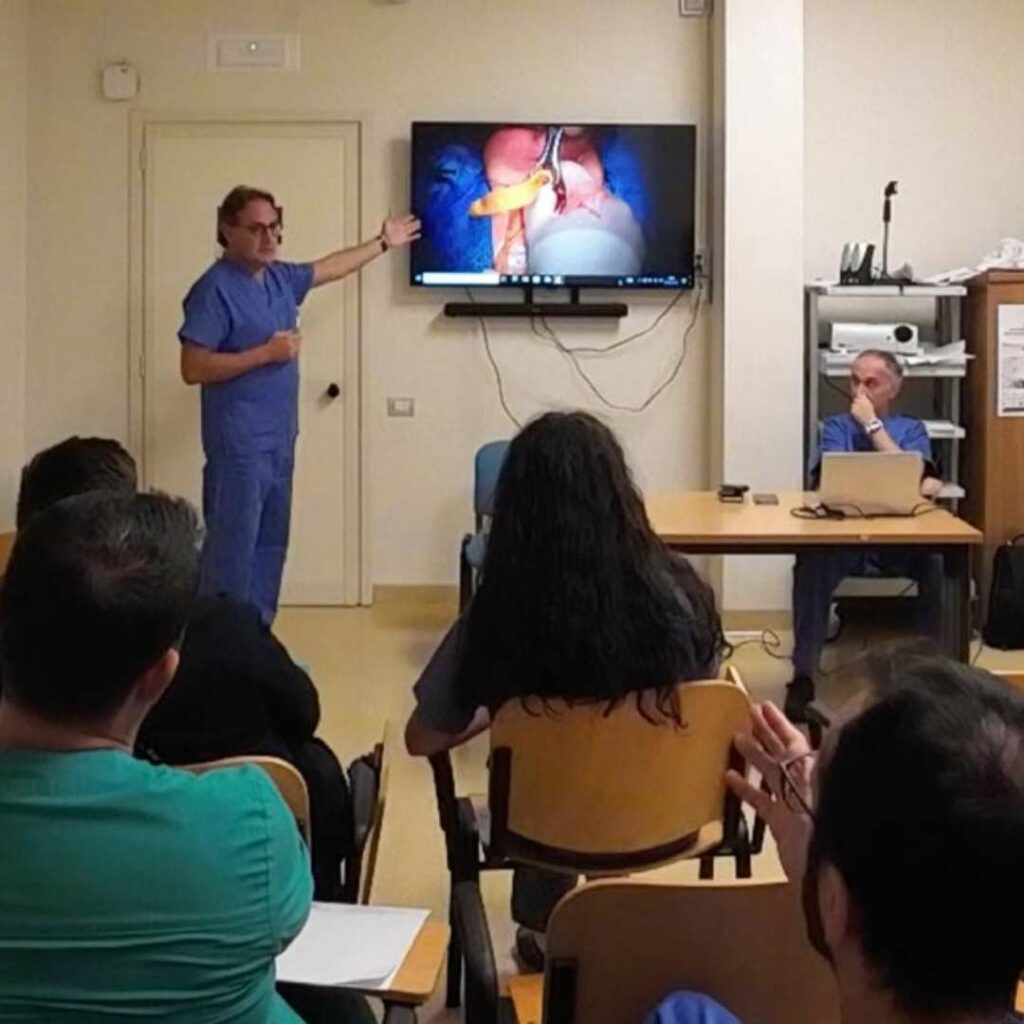Antonini as Lecturer at the University of Bari: A Masterclass on Hydraulic Penile Implants
 Dr. Antonini, a urologist and andrologist of international renown, was a distinguished guest at the University of Bari, invited by Professor Pasquale Di Tonno, Director of the Department of Urology, and Dr. Giuseppe Dachille, a prominent specialist in the field. During this significant event, Dr. Antonini delivered a masterclass that garnered great interest from both students and professionals alike, focusing on a subject of increasing relevance in the field of urology: the implantation of three-component hydraulic penile prostheses. The lecture centered specifically on the minimally invasive technique utilizing an infrapubic approach, one of the most advanced and innovative methods in the treatment of severe erectile dysfunction. This technique, representing a substantial leap forward in prosthetic surgery, is lauded for its benefits, which include shorter recovery times, reduced postoperative pain, and superior aesthetic and functional outcomes.
Dr. Antonini, a urologist and andrologist of international renown, was a distinguished guest at the University of Bari, invited by Professor Pasquale Di Tonno, Director of the Department of Urology, and Dr. Giuseppe Dachille, a prominent specialist in the field. During this significant event, Dr. Antonini delivered a masterclass that garnered great interest from both students and professionals alike, focusing on a subject of increasing relevance in the field of urology: the implantation of three-component hydraulic penile prostheses. The lecture centered specifically on the minimally invasive technique utilizing an infrapubic approach, one of the most advanced and innovative methods in the treatment of severe erectile dysfunction. This technique, representing a substantial leap forward in prosthetic surgery, is lauded for its benefits, which include shorter recovery times, reduced postoperative pain, and superior aesthetic and functional outcomes.
Three-component hydraulic penile prostheses are medical devices designed for patients with erectile dysfunction who do not respond to pharmacological treatments. These prostheses, composed of three main components (two cylinders, a pump, and a reservoir), allow the patient to achieve an erection similar to a natural one through a mechanical activation system, significantly improving their quality of life. Dr. Antonini elaborated in detail on the advantages of the minimally invasive infrapubic approach, which involves the insertion of the prosthesis through a small incision in the pubic region. This method notably reduces both operating time and postoperative complications, such as infections or hematomas, when compared to more invasive techniques. Moreover, the infrapubic approach ensures minimal visibility of scarring, a factor highly valued by patients for aesthetic reasons.
Dr. Antonini’s presentation sparked considerable interest among the audience, which included both young urologists in training and established practitioners. The event provided a valuable opportunity to delve deeper into a cutting-edge technique that is becoming increasingly prevalent in specialized operating rooms. Thanks to the dedication of leading figures such as Professor Di Tonno and Dr. Dachille, the University of Bari continues to distinguish itself as a central player in the education of new talents in the fields of urology and andrology. The organization of masterclasses like that held by Dr. Antonini highlights the university’s commitment to the ongoing education of its students and its collaboration with internationally recognized experts.
In conclusion, Dr. Antonini’s presence at the University of Bari represented a pivotal moment of scientific growth and enrichment for all attendees. His expertise and proficiency in the field of hydraulic penile prostheses and minimally invasive techniques provided invaluable contributions to the urological community and to future specialists in the discipline.